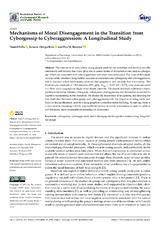Mechanisms of Moral Disengagement in the Transition from Cybergossip to Cyberaggression: A Longitudinal Study
Autor
Falla Fernández, Daniel
Ortega Ruiz, Rosario
Romera Félix, Eva M.
Editor
MDPIFecha
2021Materia
CybergossipCyberaggression
Moral disengagement
Cognitive restructuring
Longitudinal design
METS:
Mostrar el registro METSPREMIS:
Mostrar el registro PREMISMetadatos
Mostrar el registro completo del ítemResumen
The internet is an area where young people establish relationships and develop socially, emotionally and morally, but it also gives rise to certain forms of online behaviour, such as cybergossip, which are associated with cyberaggression and other risky behaviour. The aims of this study were to verify whether a longitudinal association exists between cybergossip and cyberaggression, and to discover which mechanisms of moral disengagement may mediate this relationship. The final sample consisted of 1392 students (50% girls; Mage = 13.47; SD = 0.77), who were surveyed in a three-wave longitudinal study at six-month intervals. The results obtained confirmed a direct, positive relationship between cybergossip, subsequent cyberaggression and the mediation exerted by cognitive restructuring in this transition. We discuss the importance of recognizing and detecting the fine distinction between online gossip and cyberaggression with the intention of doing harm, and focus on the justifications used by young people to normalize online bullying. To sum up, there is a clear need to encourage ethical, responsible behaviour in online interactions in order to achieve well-balanced, more sustainable relationships in classrooms.

